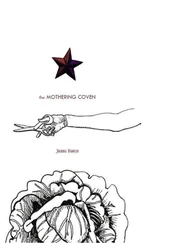(Sorry. But watch out.)
Whom did we meet in that matron blackness but The Woman Who Has No Brand Name.
“I suppose you are wondering,” she said (and I enjoyed her enjoyment of my enjoyment of her enjoyment of that cliche) “why I have brought you here.”
We did.
We wondered why we were in a white-walled penthouse living room overlooking the East River at night with furniture so sharp-edged and ultra-modern that you could cut yourself on it, with a wall-length bar, with a second wall hung entirely in black velvet like a stage, with a third wall all glass, outside which the city did not look quite as I remembered it.
Now J (as I shall call her) is really terrifying, for she’s invisible. Against the black curtains her head and hands float in sinister disconnection, like puppets controlled by separate strings. There are baby spotlights in the ceiling, which illuminate in deep chiaroscuro her gray hair, her lined face, her rather macabre grin, for her teeth seem to be one fused ribbon of steel. She stepped out against the white wall, a woman-shaped hole, a black cardboard cut-out; with a crooked, charming smile she clapped her hand to her mouth, either taking something out or putting something in—see? Real teeth. Those disbodied, almost crippled hands clasped themselves. She sat on her black leather couch and vanished again; she smiled and dropped fifteen years; she has silver hair, not gray, and I don’t know how old she is. How she loves us! She leans forward and croons at us like Garbo. Jeannine has sunk down into a collection of glass plates that passes for a chair; her cup and spoon make a tiny, spineless chattering. Janet is erect and ready for anything.
“I’m glad, so glad, so very glad,” says J softly. She doesn’t mind Jeannine’s being a coward. She turns the warmth of her smile on Jeannine the way none of us has ever been smiled at before, a dwelling, loving look that would make Jeannine go through fire and water to get it again, the kind of mother-love whose lack gets into your very bones.
“I am called Alice Reasoner,” says J, “christened Alice-Jael; I am an employee of the Bureau of Comparative Ethnology. My code name is Sweet Alice; can you believe it?” (with a soft, cultivated laugh) “Look around you and welcome yourselves; look at me and make me welcome; welcome myself, welcome me, welcome I,” and leaning forward, a shape stamped by a cookie-cutter on to nothing, with pleasant art and sincere gestures, Alice-Jael Reasoner told us what you have no doubt guessed long, long ago.
(Her real laugh is the worst human sound I have ever heard: a hard, screeching yell that ends in gasps and rusty sobbing, as if some mechanical vulture on a gigantic garbage heap on the surface of the moon were giving one forced shriek for the death of all organic life. Yet J likes it. This is her private laugh. Alice is crippled, too; the ends of her fingers (she says) were once caught in a press and are growing cancerous—and to be sure, if you look at them closely you can see folds of loose, dead skin over the ends of her fingernails. She has hairpin-shaped scars under her ears, too.
Her pointed fingernails painted silver to distract the eye, Alice-Jael plays with the window console: the East River clouds over to reveal (serially) a desert morning, a black lava beach, and the surface of the moon. She sat, watching the pictures change, tapping her silver nails on the couch, herself the very picture of boredom. Come up close and you’ll see that her eyes are silver, most unnatural. It came to me that we had been watching this woman perform for half an hour and had given not one thought to what might be happening around us or to us or behind us. The East River?
( “An artist’s conception,” she says. )
“I am,” says Jael Reasoner, “an employee of the Bureau of Comparative Ethnology and a specialist in disguises. It came to me several months ago that I might find my other selves out there in the great, gray might-have-been, so I undertook—for reasons partly personal and partly political, of which more later—to get hold of the three of you. It was very hard work. I’m a field worker and not a theoretician, but you must know that the closer to home you travel, the more power it takes, both to discriminate between small degrees of difference and to transport objects from one universe of probability into another.
“If we admit among the universes of probability any in which the laws of physical reality are different from our own, we will have an infinite number of universes. If we restrict ourselves to the laws of physical reality as we know them, we will have a limited number. Our universe is quantized; therefore the differences between possible universes (although very small) must be similarly quantized, and the number of such universes must be finite (although very large). I take it that it must be possible to distinguish the very smallest differences—say, that of one quantum of light—for otherwise we could not find our way to the same universe time after time, nor could we return to our own. Current theory has it that one cannot return to one’s own past, but only to other people’s; similarly one cannot travel into one’s own future, but only to other people’s, and in no way can these motions be forced to result in straightforward travel— from any baseline whatever . The only possible motion is diagonal motion. So you see that the classical paradoxes of time-travel simply do not apply—we cannot kill our own grandmothers and thereby cease to exist, nor can we travel into our own future and affect it in advance, so to speak. Nor can I, once I have made contact with your present, travel into your past or your future. The best I can do in finding out my own future is to study one very close to my own, but here the cost of power becomes prohibitive. My Department’s researches are therefore conducted in regions rather far from home. Go too far and you find an Earth too close to the sun or too far away or nonexistent or barren of life; come too close and it costs too much. We operate in a pretty small optimal range. And of course I was doing this on my own, which means I must steal the whole damn operation anyway.
“You, Janet, were almost impossible to find. The universe in which your Earth exists does not even register on our instruments; neither do those for quite a probable spread on either side of you; we have been trying for years to find out why. Besides you are too close to us to be economically feasible. I had located Jeannine and not Joanna; you very obligingly stepped out of place and became as visible as a sore thumb; I’ve had a fix on you ever since. The three of you got together and I pulled you all in. Look at yourselves.
“Genetic patterns sometimes repeat themselves from possible present universe to possible present universe; this is also one of the elements that can vary between universes. There is repetition of genotypes in the far future too, sometimes. Here is Janet from the far future, but not my future or yours; here are the two of you from almost the same moment of time (but not as you see it!), both of those moments only a little behind mine; yet I won’t happen in the world of either of you. We are less alike than identical twins, to be sure, but much more alike than strangers have any right to be. Look at yourselves again.
“We’re all white-skinned, eh? I bet two of you didn’t think of that. We’re all women. We are tall, within a few inches of each other. Given a reasonable variation, we are the same racial type, even the same physical type—no redheads or olive skins, hm? Don’t go by me; I’m not natural! Look in each other’s faces. What you see is essentially the same genotype, modified by age, by circumstances, by education, by diet, by learning, by God knows what. Here is Jeannine, the youngest of us all with her smooth face: tall, thin, sedentary, round-shouldered, a long-limbed body made of clay and putty; she’s always tired and probably has trouble waking up in the morning. Hm? And there’s Joanna, somewhat older, much more active, with a different gait, different mannerisms, quick and jerky, not depressed, sits with her spine like a ruler. Who’d think it was the same woman? There’s Janet, hardier than the two of you put together, with her sun-bleached hair and her muscles; she’s spent her life outdoors, a Swedish hiker and a farmhand. You begin to see? She’s older and that masks a good deal. And of course she has had all the Whileawayan improvements—no rheumatism, no sinus trouble, no allergies, no appendix, good feet, good teeth, no double joints, and so forth and so forth, all the rest that we three must suffer. And I, who could throw you all across the room, though I don’t look it. Yet we started the same. It’s possible that in biological terms Jeannine is potentially the most intelligent of us all; try to prove that to a stranger! We ought to be equally long-lived but we won’t be. We ought to be equally healthy but we’re not. If you discount the wombs that bore us, our pre-natal nourishment, and our deliveries (none of which differ essentially) we ought to have started out with the same autonomic nervous system, the same adrenals, the same hair and teeth and eyes, the same circulatory system, and the same innocence. We ought to think alike and feel alike and act alike, but of course we don’t. So plastic is humankind! Do you remember the old story of the Doppelganger? This is the double you recognize instantly, with whom you feel a mysterious kinship. An instant sympathy, that informs you at once that the other is really your very own self. The truth is that people don’t recognize themselves except in mirrors, and sometimes not even then. Between our dress, and our opinions, and our habits, and our beliefs, and our values, and our mannerisms, and our manners, and our expressions, and our ages, and our experience, even I can hardly believe that I am looking at three other myselves. No layman would entertain for a moment the notion that he beheld four versions of the same woman.
Читать дальше












